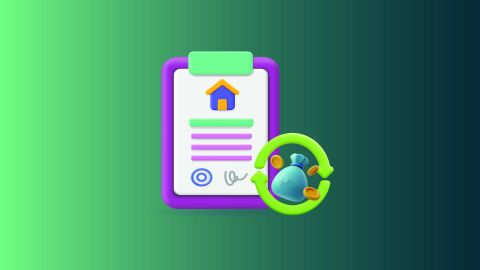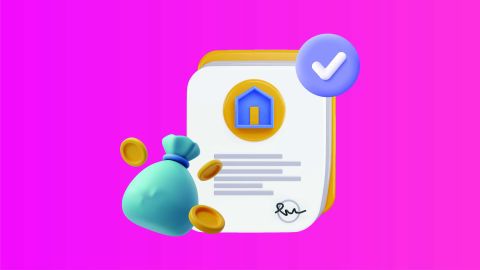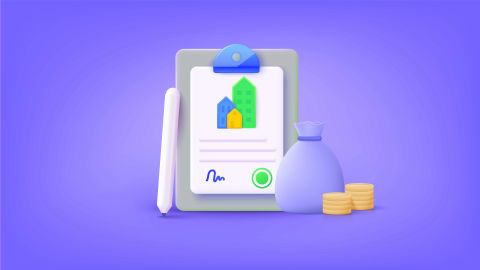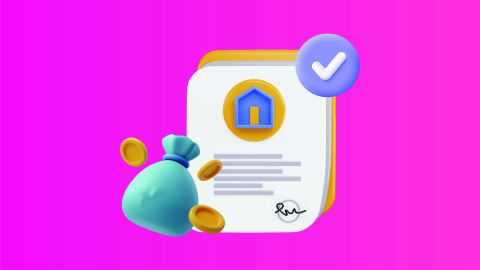Mortgage loan interest rates play a crucial role in determining the overall cost of borrowing and your long-term repayment commitment. The mortgage loan interest rate is influenced by factors such as economic conditions, RBI policies like the repo rate, property type, loan tenure, and the borrower’s credit profile. Since mortgage loans are secured, the mortgage loan rate of interest is generally lower compared to unsecured loans, making them a cost-effective option for high-value funding needs. Understanding how these rates work helps you compare offers, plan EMIs better, and choose a loan structure that aligns with your financial goals.
What are mortgage loan interest rates?
Mortgage loan interest rates determine the cost of borrowing, expressed as a percentage of the loan amount. These rates can be fixed, remaining constant throughout the tenure, or variable, adjusting with market fluctuations. In India, rates usually start around 9% and vary based on factors like credit score, loan-to-value ratio, and property specifics. A clear understanding of these rates is crucial since they directly influence your loan's total cost. Comparing rates across lenders ensures you secure the most affordable option tailored to your financial needs.
Current mortgage loan interest rates: Applicable fees and charges
We advise you to read about our fees and charges thoroughly before applying.
Type of fee |
Applicable charges |
Rate of interest (fixed or floating rate of interest) |
8% to 18% per annum |
Processing fee |
Up to 3.54% of the loan amount (inclusive of applicable taxes) |
Documentation charges |
Up to Rs. 2,360/- (inclusive of applicable taxes) |
Flexi facility charge |
Term Loan – Not applicable Flexi Loan – Up to Rs 999/- to Rs 29,999/- (Inclusive of applicable taxes) will be deducted upfront from loan amount. |
Prepayment charges |
Full Pre-Payment •Term Loan: Up To 4.72% (Inclusive Of Applicable Taxes) On The Outstanding Loan Amount As On The Date Of Full Pre-Payment •Flexi Term (Dropline) Loan: Up To 4.72% (Inclusive Of Applicable Taxes) on the outstanding loan amount, As On The Date Of Full Pre-Payment. •Flexi Hybrid Term Loan: Up To 4.72% (Inclusive Of Applicable Taxes) on the outstanding loan amount, As On The Date Of Full Pre-Payment. Part Pre-Payment •Term Loan: Up To 4.72% (Inclusive Of Applicable Taxes) Of Principal Loan Amount Prepaid On The Date Of Such Part Pre-Payment •Not Applicable For Flexi Term (Dropline) Loan And Flexi Hybrid Term Loan Note: - If All Borrowers And Co-Borrowers Are Individual, Or Micro And Small Enterprises (Mses) And Loan Availed On Floating Interest Rates, Then There Will Be No Foreclosure / Part Payment Charges. |
Annual maintenance charges |
Term Loan: Not Applicable Flexi Term Loan (Flexi Dropline): Not applicable Flexi Hybrid Term Loan: Up to 0.295%(Inclusive of applicable taxes) of the Dropline Limit during Initial Loan tenure. Not applicable for subsequent loan tenure. |
Bounce charges |
Rs. 1,500 per bounce. |
Penal charge |
Penal charge is applicable in the following scenarios: Delay in payment of instalment(s) shall attract Penal Charge at the rate of 36% per annum per instalment from the respective due date until the date of receipt of the full instalment(s) amount. |
Stamp duty (as per respective state) |
Payable as per state laws |
Mortgage origination fees |
Up to Rs. 6,000/- per property (inclusive of applicable taxes). *In case of re-valuation of the property then MOF will be levied again and shall be deducted from loan disbursement amount |
| Repossession charges |
Recovery of charges |
*The option of switching from floating to fixed rate of interest and vice versa would be applicable only to Borrowers whose loan qualify as personal loan as per RBI circular on Reset of Floating Interest Rate on Equated Monthly Instalments (EMI) based Personal Loans- RBI/2023-24/55-DOR.MCS.REC.32/01.01.003/2023-24.
Personal loans refers to loans given to individuals and consist of (a) consumer credit, (b) education loan, (c) loans given for creation/ enhancement of immovable assets (e.g., housing, etc.), and (d) loans given for investment in financial assets (shares, debentures, etc.).
Further, Consumer credit refers to the loans given to individuals, which consists of (a) loans for consumer durables, (b) credit card receivables, (c) auto loans (other than loans for commercial use), (d) personal loans secured by gold, gold jewellery, immovable property, fixed deposits (including FCNR(B)), shares and bonds, etc., (other than for business / commercial purposes), (e) personal loans to professionals (excluding loans for business purposes), and (f) loans given for other consumptions purposes (e.g., social ceremonies, etc.). However, it excludes (a) education loans, (b) loans given for creation/ enhancement of immovable assets (e.g., housing, etc.), (c) loans given for investment in financial assets (shares, debentures, etc.), and (d) consumption loans given to farmers under KCC. For risk weighting purposes under the Capital Adequacy Framework, the extant regulatory guidelines will be applicable. (as defined in XBRL Returns – Harmonization of Banking Statistics-RBI/2017-18/117-DBR.No.BP.BC.99/08.13.100/2017-18)
Factors Affecting Land Mortgage Loan Interest Rates
Mortgage loan interest rate are typically low owing to their secured nature. As a result, borrowers enjoy comfortable repayment and low cost of borrowing. Several factors influence mortgage loan interest, read on to know more about these.
1. Property type and location
Although any immovable asset is eligible for a loan against property, its type determines the mortgage loan rates. For instance, lenders offer different interest rates for residential and commercial properties. Besides, the resale value of a property, its location, also influences this interest rate.
Usually, a property located in the heart of a city with modern amenities has higher resale value. Hence, on mortgaging that property, lenders can ascertain the recovery of the loan amount in case you default. Consequently, interest rates will be lower. Similarly, the property’s age also affects mortgage loan interest rates. The newer the property, lower the interest rates.
Got a property in a prime city location? That’s not just good news for resale value—it could also help you secure a loan against property at lower interest rates. The better the location and condition of your property, the more favourable the terms. Why not make your asset work for you? By using your property as collateral, you can unlock access to large funds of up to Rs. 10.50 Crore*—it is a smart way to manage your finances with ease! Get funds within 72 hours* of approval.
2. Credit score
Lenders also consider a borrower’s credit profile before deciding mortgage interest rates. Below are some of the aspects that influence this rate.
- Credit score
- Income
- Employment type
- Age
- Credit utilisation ratio
- FOIR
- Existing debts
Preferably, a credit score of 750 and above is deemed ideal to secure competitive interest rates from lenders. Similarly, the interest rate for a 55-year old salaried applicant would be more as he/ she would retire from the job soon.
Moreover, lenders also check how the applicant handled previous debts, repaid on time or not, etc. Since all these factors directly influence credit score, it is important to adopt healthy financial habits to upkeep the score. It helps in availing the best mortgage loan rate of interest available in market.
3. Size of loan
A mortgage loan is a high-value credit, and it is possible to avail up to 80% LTV against a property. However, high-value loans are risky on a lender’s part, as monthly instalments are higher in that case. Therefore, to compensate for the risk of borrowing, they may charge a high mortgage loan interest rate when loan amount is substantial. Hence, it is necessary to assess the exact credit requirement before applying to ensure competitive interest rates.
Note: Avoid pledging high-value assets to avail a small mortgage loan.
4. Loan tenor
The tenure of loan also plays a crucial role in deciding mortgage loan interest rates. Usually, a mortgage loan accompanies a long tenure, and you can choose a term as per your repayment capacity. Nonetheless, on selecting a shorter tenor for high loan value, lenders may consider you a risky borrower. In such cases, the interest rate is usually higher.
Nonetheless, opting for a longer tenure can increase the total interest outgo in the long run. In this case, use an online Mortgage Loan Calculator to check the EMI outgo after entering tenure and interest rate proposed to you.
Besides these reasons, interest of mortgage loan can also be influenced by market conditions if the rate type opted for is floating in nature.
Need a large amount but don’t want sky-high interest? A loan against property can give you up to 80% of your property's value with flexible repayment options. Choosing the right tenure can balance both EMI affordability and interest outgo—get strategic with your financing! Get loan of up to Rs. 10.50 Crore* against your property from Bajaj Finance within 72 hours* of the approval.
How to calculate mortgage loan interest rates?
Calculating rate of interest for mortgage loan involves understanding both nominal and effective interest rates. The nominal rate is the stated annual rate, while the effective rate considers compounding within the year. To calculate monthly interest, divide the annual nominal rate by 12. For example, if your nominal rate is 6%, the monthly rate is 0.5%. Use this rate in the formula for monthly payments:
M = P × (1 + r)^n - 1 / r × (1 + r)^n
Where,
M is the monthly payment,
P is the loan principal,
r is the monthly interest rate, and
n is the number of payments.
Understanding the rate of interest for mortgage loan is essential for accurate repayment planning and loan management.
How to reduce your mortgage loan interest rate?
Lowering the interest rate on your mortgage loan can result in significant savings over time. Here are some practical tips to help you achieve this:
- Maintain a high credit score
Pay EMIs and credit card bills on time. Avoid excessive debt and ensure a low credit utilization ratio. - Choose a shorter loan tenure
While it increases monthly EMIs, a shorter tenure reduces the total interest outgo. - Ensure a stable income
A steady job and consistent income can improve your credibility with lenders. - Compare loan offers
Research interest rates across multiple lenders to find the most competitive deal. - Negotiate smartly
Use your good credit history and existing relationships with lenders to negotiate for better rates. - Consider balance transfers
If your current lender offers a higher rate, transfer your loan to another lender with lower rates.
How to apply for Mortgage loan?
You can apply for a mortgage loan to fulfil your financial needs by following easy steps with Bajaj Finance:
- Click on the 'APPLY’ and start.
- Enter your pin code and click Proceed.
- Provide basic details like your full name and mobile number.
- Now select the type of loan that you wish to apply for, your net monthly income, your area pin code, and the required loan amount.
- Generate and submit your OTP to verify your phone number.
- Enter further details like your property location, your current EMI amount/ monthly obligation, and your PAN number.
- Click on the ‘SUBMIT’ button.
That is it! Your mortgage loan request is submitted. Our representative will connect with you and guide you through the next steps.
Types of mortgage loan
There are different types of mortgage loans, depending upon the nature of the mortgage and the mortgage interest rates vary from one loan type to another. Know them before you apply for one.
- Simple mortgage: It involves personal mortgaging of an immovable property, which bestows upon the lender a right to sell such property for loan recovery in case a borrower fails to repay the amount
- English mortgage: It involves the creation of personal liability for the borrower, whereby mortgage involves property transfer to the lender and recovery, thereby after successful repayment
- Usufructuary mortgage: The arrangement involves the transfer of property possession, allowing a lender to receive rent or any other payment for such property until loan repayment in full
- Mortgage via a deposit of title deed: It comprises the process of a borrower depositing the mortgaged property’s title deed with the lender until repayment is complete
- Conditional sale mortgage: It refers to an arrangement wherein the property is sold to the lender with such sale becoming effective only in the case of repayment defaults. However, successful repayment nullifies the sale arrangement.
If identifying a particular mortgage type within these classifications is not possible, it is termed as an anomalous mortgage.
Types of mortgage loans and their key features
Lenders provide mortgage loans customised to suit diverse funding needs of borrowers. Features, benefits, and mortgage loan interest rates on such advances vary with the credit option and lender selected. They include:
Loan against property
The high-value loan comes with no restriction to end-use, allowing borrowers to utilise it for diverse, big-ticket funding needs. Loan utilisation in this case includes fulfilling funding needs for the likes of business expansion, asset acquisition, medical emergencies, wedding expenses, etc.
Mortgage loans with flexi hybrid feature
Bajaj Housing Finance Limited provides its Mortgage Loan with the Flexi Hybrid feature, which allows borrowers to make multiple withdrawals from a pre-sanctioned loan amount. Also, interest accruals only on the withdrawn amount makes EMIs affordable.
Top-ups on mortgage loans
Borrowers can also avail a top-up advance when availing a balance transfer facility for an existing mortgage loan. It comes with a high loan quantum and at low mortgage loan interest rates.
Not sure which mortgage type suits you best? A loan against property is one of the most versatile options—it’s backed by your real estate and gives you funds without usage restrictions. Whether it’s for business, education, or medical needs, this route offers financial flexibility with security. Leverage the power of your property to fulfil multiple financial needs. Get a loan against property with simple application process.
Bajaj Finserv app for all your financial needs and goals
Trusted by 50 million+ customers in India, Bajaj Finserv App is a one-stop solution for all your financial needs and goals.
You can use the Bajaj Finserv App to:
- Apply for loans online, such as Instant Personal Loan, Home Loan, Business Loan, Gold Loan, and more.
- Invest in fixed deposits and mutual funds on the app.
- Choose from multiple insurance for your health, motor and even pocket insurance, from various insurance providers.
- Pay and manage your bills and recharges using the BBPS platform. Use Bajaj Pay and Bajaj Wallet for quick and simple money transfers and transactions.
- Apply for Insta EMI Card and get a pre-qualified limit on the app. Explore over 1 million products on the app that can be purchased from a partner store on Easy EMIs.
- Shop from over 100+ brand partners that offer a diverse range of products and services.
- Use specialised tools like EMI calculators, SIP Calculators
- Check your credit score, download loan statements and even get quick customer support—all on the app.
Download the Bajaj Finserv App today and experience the convenience of managing your finances on one app.
Frequently asked questions
Personal Loans and Mortgage Loans are two different types of advances Bajaj Finserv provides with different purposes and features having different rates of interest.
Difference between Personal Loan vs Mortgage Loan include:
- Personal Loans are unsecured credit offered to individuals with high creditworthiness. Mortgage Loans are secured advances provided against property mortgage
- You can avail mortgage credit of high value at a lower rate of interest as against a personal credit with lower value and high interest rate
- Mortgage Loans come with longer repayment tenures than personal advances.
Between a personal loan and loan against property, the latter becomes a more convenient and affordable financing option if you have a property to be mortgaged. Apply for it with essential documents to enjoy quick approval.
The changes in mortgage loan interest rates will depend on internal benchmark of financial institutions.
Bajaj Finserv Loan Against Property is one of the best mortgage loans to avail as it comes with unique borrower-friendly features such as:
- High-value loan of up to Rs. 10.50 crore* to meet big-ticket expenses
- The flexible tenure of up to 15 years for convenience in repayment
- Fastest property loan with approval within 72 hours* and disbursal within 3 days* of approval
- High-value top up Loans with balance transfer facility at lower rates of interest
- Flexi loan facility for anytime-withdrawal from pre-sanctioned credit amount and interest repayment only on the amount withdrawn
To avail these attractive features of Bajaj Finserv Mortgage Loan, apply with the online form.
When it comes to home loan vs mortgage loan, the most vital differences to consider include:
- While the former is a type of mortgage credit itself, the latter is an advance lenders provide against collateral. Both home loan and loan against property are loans availed against the property mortgaged
- A mortgage credit does not have a fixed purpose of use; a home advance is provided to acquire a residential house
- For the former, lenders pay directly to the seller, while the amount of a mortgage credit like advance against property may be transferred directly to your account
With this difference sorted, you can apply for a loan against property with Bajaj Finserv as it comes with no end-use restriction.
Yes, this is possible if you have opted for floating interest rate. This depends on internal benchmark of financial institutions also. So, changes in mortgage loan interest rate will directly impact your interest rates too.
Maximum mortgage loan amount a borrower is eligible to avail depends on the loan to value (LTV) ratio offered by the lender among other factors. With the best lenders, the LTV can range between 70% to 75% of the property’s market value. Bajaj Finserv provides loan against property up to 80% of the property’s market value.
Generally, a loan against property is not taxable as it is considered a loan, not income. However, if you utilise the loan amount for investment in taxable avenues, the income from such investment may be taxable. As tax rules can be complex and change regularly, it is advisable to consult a tax advisor for accurate information tailored to your specific circumstances.
Yes, interest rates can vary based on the type of property. Lenders may charge different interest rates for residential properties than commercial ones. The risks associated with the property, its location, its condition, and its market value can all influence the interest rate.
Yes, in some cases, you can certainly negotiate the interest rates on your mortgage with your lender. However, this often depends on various factors such as your credit score, your relationship with the bank, the size of the loan, your income stability, and prevailing market conditions. It is always worth discussing the possibilities for a better deal with your lender.








